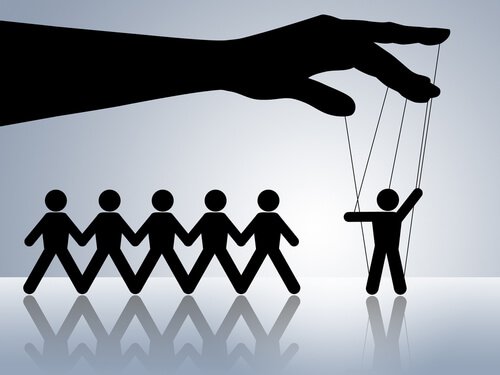The Victimizing Manipulator

Being, or rather seeming, the eternal victim can have many advantages. The victim, one way or another, is safeguarded from the criticism of others. They also have the compassion and understanding of many, regardless of what they do. In fact, whoever dares to question the acts of an alleged victim is considered to be insensitive or callous.
Victimhood is, in many cases, a strategy that represents more benefits than problems. This condition allows for a kind of immunity that everything they say is true, everything they do is with good intentions, and that everything they think is legitimate. But in more than one case, that calculated victimization consciously or unconsciously conceals blackmail.

The victims
There are, of course, real situations of victimization such as when someone has been subject to abuse or excess, without having had a chance to react. For example, when a person is assaulted in the street or abused by another person who holds a power over them they cannot overcome: the power of a weapon, a uniform, position, etc.
Such situations give rise to an objective condition of victimization. But this condition is not eternal, nor should it be a seal that the person carries wherever they go. After leaving the specific situation of powerlessness, they continue with the role of victim as an option, not a finite reality.
One thing is certain: a victim demands attention, care, support and affection. They require that dedication and that understanding to leave their state of shock and vulnerability. This cannot be argued.
What it is open to debate is victimhood as an existential position. A traumatic event becomes an eternal cover letter. And not just to give testimony to an execrable fact, but to gain privileges that would otherwise not be obtained.
These are the kinds of people who make sure their suffering is carefully exposed on their living resume.
In more serious cases, some believe that being victims of a situation gives them carte blanche to hate or hurt others.

Recognizing the victimizing manipulator
There are some signs of those who manipulate through playing the victim. The main ones are:
- The victim does not directly ask for what they want, but rather sends inaccurate messages in the form of a complaint or regret. For example, they suddenly tell you: “Nobody knows how difficult it was for me to get here.” Then you do not know if they want you to recognize their merit, if they are complaining because it wasn’t as difficult for you, or if they want you to help them with something in particular.
- You feel more or less guilty when you are with that person. Every conversation you have with them leaves you with the impression of being responsible for something, but you can’t manage to define it. There is a sadness or a vague discomfort with yourself
- The victim is also suspicious and distrustful. They often alert you about bad intentions in others and justify their misdeeds through their past suffering. In fact, they may accuse you of callousness or apathy if you by chance criticize them.
- They are able to make great sacrifices for others without them having to ask. They will show off about it. When someone exhibits these traits, we are dealing with a person who has assumed the role of victim towards life. Surely it is someone who is not happy being in that position and has such behavior without really trying to do it.
Whatever the case may be, it is someone who did not finish closing the cycle of their traumatic experience. They need your understanding, but also your sincerity.
The best way to help someone like that is by telling them kindly and directly what you think of their attitude.
Image courtesy of YoSeLin
Being, or rather seeming, the eternal victim can have many advantages. The victim, one way or another, is safeguarded from the criticism of others. They also have the compassion and understanding of many, regardless of what they do. In fact, whoever dares to question the acts of an alleged victim is considered to be insensitive or callous.
Victimhood is, in many cases, a strategy that represents more benefits than problems. This condition allows for a kind of immunity that everything they say is true, everything they do is with good intentions, and that everything they think is legitimate. But in more than one case, that calculated victimization consciously or unconsciously conceals blackmail.

The victims
There are, of course, real situations of victimization such as when someone has been subject to abuse or excess, without having had a chance to react. For example, when a person is assaulted in the street or abused by another person who holds a power over them they cannot overcome: the power of a weapon, a uniform, position, etc.
Such situations give rise to an objective condition of victimization. But this condition is not eternal, nor should it be a seal that the person carries wherever they go. After leaving the specific situation of powerlessness, they continue with the role of victim as an option, not a finite reality.
One thing is certain: a victim demands attention, care, support and affection. They require that dedication and that understanding to leave their state of shock and vulnerability. This cannot be argued.
What it is open to debate is victimhood as an existential position. A traumatic event becomes an eternal cover letter. And not just to give testimony to an execrable fact, but to gain privileges that would otherwise not be obtained.
These are the kinds of people who make sure their suffering is carefully exposed on their living resume.
In more serious cases, some believe that being victims of a situation gives them carte blanche to hate or hurt others.

Recognizing the victimizing manipulator
There are some signs of those who manipulate through playing the victim. The main ones are:
- The victim does not directly ask for what they want, but rather sends inaccurate messages in the form of a complaint or regret. For example, they suddenly tell you: “Nobody knows how difficult it was for me to get here.” Then you do not know if they want you to recognize their merit, if they are complaining because it wasn’t as difficult for you, or if they want you to help them with something in particular.
- You feel more or less guilty when you are with that person. Every conversation you have with them leaves you with the impression of being responsible for something, but you can’t manage to define it. There is a sadness or a vague discomfort with yourself
- The victim is also suspicious and distrustful. They often alert you about bad intentions in others and justify their misdeeds through their past suffering. In fact, they may accuse you of callousness or apathy if you by chance criticize them.
- They are able to make great sacrifices for others without them having to ask. They will show off about it. When someone exhibits these traits, we are dealing with a person who has assumed the role of victim towards life. Surely it is someone who is not happy being in that position and has such behavior without really trying to do it.
Whatever the case may be, it is someone who did not finish closing the cycle of their traumatic experience. They need your understanding, but also your sincerity.
The best way to help someone like that is by telling them kindly and directly what you think of their attitude.
Image courtesy of YoSeLin
This text is provided for informational purposes only and does not replace consultation with a professional. If in doubt, consult your specialist.







